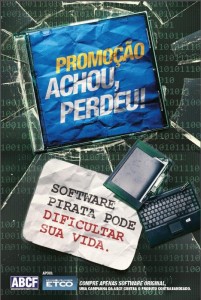Finished with an exciting award ceremony, held on the 8th, the 5th edition of the Video Legal Contest was attended by 520 students from the cities of São Paulo (SP) and Brasília (DF). The initiative, which is sponsored by the Brazilian Institute of Ethics in Competition - ETCO, aims to educate elementary school students about the damage caused by piracy.
In the city of São Paulo, 120 students from the municipal network gathered in groups to create videos on the topic. In the Federal Capital, the number of applicants was surprising: 400 pre-adolescent students from the Inter-school Language Centers (Cils), a complementary education network in Brasília, participated in the contest.
In São Paulo, of the ten piracy videos produced by students and selected for the final stage, six were awarded. The trophies and prizes were delivered at Amcham's headquarters, the American Chamber of Commerce, in the south of the city. Teachers, pedagogical coordinators, students and representatives of sponsoring institutions were present.
For Heloisa Ribeiro, executive director of ETCO, the messages that the students transmitted with the content of the videos were important for the personal training of each one. They also serve as an example to family and friends, encouraging the fight against piracy and increasing awareness of the problem.
The consul general of the United States in São Paulo, Dennis Hankins, stressed that the objective of the contest was to show students that producing an intellectual work requires effort, and that authors have the right to be rewarded for their work.
In addition to ETCO, the initiative was sponsored by the United States Consulate General, Eli Lilly, Microsoft, HP, Walt Disney Company, Sport Club Corinthians Paulista and the São Paulo Municipal Department of Education.
The winning students in each category won the right to visit the Microsoft Technology Center in São Paulo, along with the winners of the Brasília stage. In Capital Federal, the winning work was Beware, pirate glasses, from Cil 1. In São Paulo, the six winning works were:
Category 1 (10 to 12 years)
1. Municipal Elementary School (EMEF) Professor Máximo de Moura - Piracy? Copyright? What is it?
2. EMEF Doctor José Dias da Silveira - Jornal Zé Dias
3. EMEF Professor Primo Páscole Melaré - Nature asks for passage
Category 2 (12 to 14 years)
1. EMEF Professor Sylvia Martin Pires - A Pirated Addiction
2. EMEF May 8 - The old piracy
3. EMEF Zilka Salaberry de Carvalho - Zilka news on modern piracy
Source: Amcham of Brazil


 The Brazilian Association to Combat Counterfeiting (ABCF), with the support of ETCO, launched, in July, in Curitiba, the campaign “Promotion Achou, Perdeu!” The initiative draws the consumer's attention to the risks of smuggled products to safety and health. A series of advertising pieces will run on billboards, bus stops and communication vehicles in Curitiba until October. The city was chosen to host the campaign for the importance of Paraná in combating smuggling via a triple frontier.
The Brazilian Association to Combat Counterfeiting (ABCF), with the support of ETCO, launched, in July, in Curitiba, the campaign “Promotion Achou, Perdeu!” The initiative draws the consumer's attention to the risks of smuggled products to safety and health. A series of advertising pieces will run on billboards, bus stops and communication vehicles in Curitiba until October. The city was chosen to host the campaign for the importance of Paraná in combating smuggling via a triple frontier.
